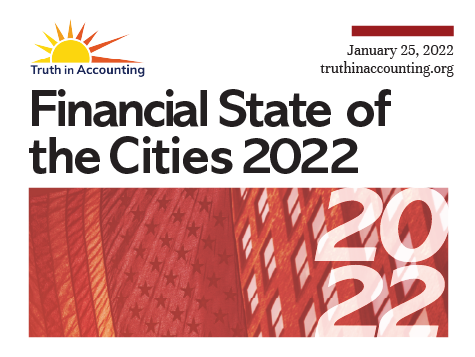
Financial State of the Cities 2022
From Truth in Accounting, January 25, 2022
Truth in Accounting has released its sixth annual Financial State of the Cities report. This comprehensive analysis surveys the fiscal health of the 75 most populated U.S. cities during the onset of the COVID-19 pandemic. The report found that 61 cities did not have enough money to pay all of their bills. Despite receiving federal assistance from the CARES Act and other COVID-19 related grants, the majority of cities’ finances worsened. Total debt among the 75 largest U.S. cities amounted to $357 billion at the end of the fiscal year 2020, which was $23.5 billion worse than the last fiscal year.
PDF: Full Report (Honolulu pg 170-171)
Top Five Sunshine Cities
1. Washington, D.C. $4,800
2. Irvine $4,700
3. Lincoln $3,100
4. Plano $2,700
5. Aurora $2,600
Bottom Five Sinkhole Cities
71. Portland -$24,900
72. Philadelphia -$25,900
73. Honolulu -$31,700
74. Chicago -$43,100
75. New York City -$71,400
(73) HONOLULU remained a Sinkhole City because it needed more than $3.9 billion, or $31,700 from each taxpayer, to pay its bills. The uncertainty surrounding this crisis makes it impossible to determine how much will be needed to maintain government services and benefits, but Honolulu’s overall debt will most likely increase.
* * * * *
Honolulu Ranked In Bottom Three For Fiscal Health
Financial State of Honolulu, HI
Despite receiving support from COVID relief grants and other federal programs, Honolulu remained in dire fiscal shape during the onset of the pandemic. Based upon the city’s fiscal year 2020 audited financial report, Honolulu had a Taxpayer Burden™ of $31,700, earning it an “F” grade from Truth in Accounting.
Honolulu’s elected officials have repeatedly made financial decisions that left the city with a debt burden of $3.9 billion. That burden came to $31,700 for every city taxpayer. Honolulu’s financial problems stem mostly from unfunded retirement obligations that have accumulated over the years. The city had set aside only 53 cents for every dollar of promised pension benefits and 24 cents for every dollar of promised retiree health care benefits.
Honolulu did not have enough money set aside to weather the pandemic and the city has been in poor fiscal shape for years. Like all other cities, Honolulu received federal assistance from the CARES Act and other COVID-19 related grants which came with stipulations on how the money could be spent. Also, the city has not been properly funding its pension and retiree health care promises which places a burden on future taxpayers.
• Honolulu had $3.3 billion available to pay $7.1 billion worth of bills.
• The outcome was a $3.9 billion shortfall, which breaks down to a burden of $31,700 per taxpayer.
• This means that each taxpayer would have to pay $31,700 in future taxes for which they would receive no related services or benefits.
